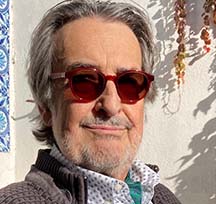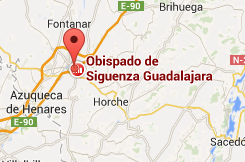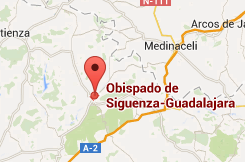 Por José Ramón Díaz-Torremocha
Por José Ramón Díaz-Torremocha
(Conferencias de San Vicente de Paúl en Guadalajara)
Email del autor: Esta dirección de correo electrónico está siendo protegida contra los robots de spam. Necesita tener JavaScript habilitado para poder verlo.
ATENCION: Al finalizar el artículo que sigue en español, está su traducción al inglés. Si algún lector deseara que se le enviaran estos artículos directamente a otro consocio o amigo, indíquelo como viene sucediendo a la dirección electrónica Esta dirección de correo electrónico está siendo protegida contra los robots de spam. Necesita tener JavaScript habilitado para poder verlo. facilitando la dirección electrónica del consocio o amigo. Al igual que aquellos que no quieran seguir recibiéndolos, indíquelo en la misma dirección de correo. Muchas gracias por su atención
YOUR ATTENTION: At the end of the following article in Spanish, there is a translation into English. If any reader wish that other fellow member or friend would receive these articles directly, please send a message as usual to Esta dirección de correo electrónico está siendo protegida contra los robots de spam. Necesita tener JavaScript habilitado para poder verlo., indicating their e-mail address. For, those who do not want to receive them anymore, please send a message to the same e-mail address. Thank you very much.
¡EL APOYO DE LA COMUNIDAD!
Habían estado meditando y profundizando sobre la comunidad fraterna de fe, oración y acción que debe ser cada una de las Conferencias de San Vicente de Paúl al igual que cualquier grupo apostólico.
Manuel, uno de los consocios de mi Conferencia, no ahorraba nunca a los consocios la caridad de hacerles pensar con sus elucubraciones modestamente “teológicas”. Decía que, ciertamente, era lo que perseguía: hacer pensar y especialmente en el Evangelio y que llegáramos a sentir gusto al hacerlo cada uno de los miembros de la Conferencia y viéramos en grupo e individualmente, lo que implicaba para nuestra vida. Manuel – Manolo para todos - era muy consciente de la necesidad de la meditación y la oración en común en el seno de la Conferencia. Afirmaba, con rotundidad, que el grupo que no tuviera claras esas dos fértiles obligaciones para cada reunión de Conferencia, sencillamente no podría serlo. No sería una Conferencia de San Vicente de Paúl, cuando faltasen alguna de ellas.
Pretendía siempre aspirar a hacerlo, aspirar a hacernos pensar al resto de los consocios, de la manera más apegada al ejemplo concreto que nos acercara a nuestra misión hacia el que sufría, de nuestra misión de servicio en Comunidad. En definitiva, acercarnos al carisma que debe distinguir nuestro servicio en las Conferencias.
Sin olvidar que estaban reflexionando sobre la comunidad, en esa ocasión a la que me refiero, tomó prestado el texto siguiente del Evangelista San Lucas (15,4) para hacer meditar a sus consocios: “Entonces, (Jesús) les dijo esta parábola. ¿Quién de vosotros que tiene cien ovejas, si pierde una de ellas, no deja las noventa y nueve en el desierto, y va a buscar la que se perdió hasta que la encuentra?”
Después de la lectura, Eduardo, un consocio siempre hacía alguna pregunta para provocar a los consocios y vencer la timidez frecuente del primero en exponer su opinión. ¿Cómo se abandonan casi cien ovejas para ir a buscar una? Comenzaba su provocación, ¿cómo se dejan solas al grueso del ganado para ir a por una de ellas? continuaba y por fin: ¿No huiría el resto del hato que se deja abandonado perdiéndose todas? En principio, había cierta confusión, pues parecía que Manuel, quería criticar el pasaje bíblico. Nada más lejos de la intención del buen consocio. Se trataba, exactamente, de lo contrario.
Verán, reflexionaba Manuel al margen de cualquier profundo y sesudo análisis teológico para el que no poseía el conocimiento necesario: porque si se dejan a todas unidas ninguna se separará y las encontrará a su vuelta el pastor donde las dejó. Puede irse tranquilo, pues en el rebaño, se sentirán seguras y se ampararán todas y cada una.
Mejor que las ovejas, también nos amparamos unos a otros en la pequeña Comunidad de amigos que conforma cada Conferencia o grupo apostólico. Nos amparamos espiritualmente y a veces también físicamente. Un ampararse en el que esté presente la oración por los consocios de nuestra Conferencia. De aquellos que comparten con nosotros la ilusión del servicio hacia aquellos que sufren.
Nos acordaremos unos de otros y le pediremos al que todo lo puede por las preocupaciones de nuestros consocios.
Hay que recordar siempre que: ni estamos solos, ni nos salvaremos solos. Ni el Misericordioso nos quiere solos.
A María, siempre a Cristo por María.
COMMUNITY SUPPORT!
They had been meditating and reflecting on the fraternal community of faith, prayer and action, that each of the Conferences of St. Vincent de Paul should be, just like any other apostolic group.
Manuel, one of the members of my Conference, never spared the fellow members the charity of making them think with his modestly "theological" elucidations. He said that, indeed, that was his aim: to make us think, especially about the Gospel, and to make each of the Conference members enjoy doing it and see, as a group and individually, what it meant for our lives. Manuel - Manolo for all of us - was very conscious of the need for common meditation and prayer within the Conference. He was adamant that a group that was not clear about these two fruitful obligations for each Conference meeting simply could not be a Conference. It would not be a St. Vincent de Paul Conference if either of them were missing.
He always sought to make the rest of the members think, in the nearest possible way to the concrete example that would bring us closer to our mission towards those who suffer, to our mission of service in Community. In short, to get closer to the charisma that should characterise our service in the Conferences.
Without forgetting that they were reflecting on the community. On that occasion to which I refer, he borrowed the following text from the Evangelist Luke (15:4) to make his fellow members meditate. Then (Jesus) told them this parable, "What man of you, having a hundred sheep, if he has lost one of them, does not leave the ninety-nine in the open country, and go after the one that is lost, until he finds it?
After the reading, Eduardo always asked a question to prompt his fellow members and to overcome their frequent shyness to express their opinion. ‘How do you abandon almost a hundred sheep to go in search of one?’, thus began his provocation. ‘How do you leave the bulk of the herd alone to go after one of them?’ He continued, and finally, ‘Wouldn't the rest of the herd flee and get lost?’ At first, there was some confusion, as it seemed that Manuel wanted to criticise the biblical passage. Nothing could be further from the good fellow's intention. It was exactly the opposite.
“You see”, reflected Manuel, without any deep theological analysis for which he did not have the necessary knowledge, "because if they are all left together, none of them will go away, and the shepherd will find them on his return where he left them. He can go with peace of mind, because in the flock, they will feel safe and each one of them will be protected”.
Better than sheep, we also protect one another in the small community of friends that makes up each Conference or apostolic group. We shelter each other spiritually and sometimes physically as well. A shelter in which we pray for our fellow members of our Conference, for those who share with us the enthusiasm for the service of those who suffer.
We will remember each other and pray to the Almighty for the worries of our fellow members.
We must always remember: we are not alone, nor will we save ourselves alone. Nor does the Merciful One want us alone.
To Mary, always to Christ through Mary.

















